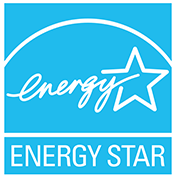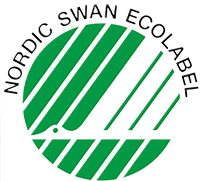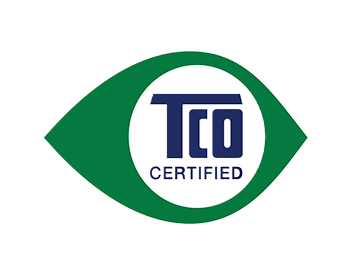Five seals for sustainable IT.
Blue Angel, GOTS, Fairtrade & CO.: You can tell which products are more sustainable than others by the seal. This also applies to IT hardware such as notebooks or laptops. If the need cannot be covered by used, refurbished hardware, they offer a good orientation before a new purchase. We present the most important labels.
Written by
.png)
Blue Angel
The Blue Angel is the first and oldest ecolabel awarded to products and services in the world with no other label in the non-food sector covering such a wide range. Award criteria are developed by The German Environment Agency and certified by RAL gGmbH. A catalogue of criteria has been developed for each product group with the most important being:
- Resource-friendly manufacturing (water, energy, materials)
- Sustainable production of resources
- Avoidance of harmful substances
- Reduced noise and electromagnetic radiation
- Longevity, ability to repair and recycle the product
At its core, the Blue Angel is an environmental label but it increasingly focuses on working conditions during the production process. Since October 2022, the Blue Angel has also been awarded to server and data storage products as well as resource-saving and energy efficient software products.
Energy Star.
Energy Star is the brain child of the U.S. Environmental Protection Agency and the most common label seen in electrical devices. It certifies particularly energy efficient products that, for example, turn off automatically after long periods of inactivity and consume hardly any power in standby. However, even though the label has been able to establish itself worldwide, it is increasingly coming under criticism for its use on monitors, printers and copiers as it’s a voluntary programme that doesn’t undergo any testing—at least in the EU. Furthermore, the label only takes into consideration energy consumption with the use of resources, durability and social responsibility not playing a role. Even though it’s worth striving for electricals that use as little energy as possible, the Energy Star label is not a recognised sustainability label.
EPEAT.
Unlike the Blue Angel, the Electronic Product Environmental Assessment Tool (EPEAT) label only certifies IT products. Managing the label is the Global Electronics Council (GEC), a non-profit organisation made up of manufacturers, recycling companies and interest groups. EPEAT evaluates products according to IEEE standards and rates them as Bronze, Silver or Gold. To achieve Bronze, a whole host of mandatory criteria have to be met including those related to energy efficiency requirements, reducing environmentally sensitive materials such as mercury, and recycling and repairs. There are also additional, optional criteria—50 per cent of which have to be fulfilled to achieve Silver and 75 per cent to achieve Gold—including, for example, reducing plastics and forgoing bonded metals.
Today, the EPEAT registry includes over 30,000 products from 50+ manufacturers in 42 countries. The ecolabel has become crucial in helping retailers and purchasers select sustainable IT products.
Nordic Ecolabel.
The Nordic Ecolabel (also known as the Nordic Swan) is backed by the governments of Denmark, Finland, Iceland and Sweden. Established in 1989, the label is available for 60 categories and a whole range of products ranging from laundry detergent and candles to children’s toys and computers. Each product category is certified according to differing criteria, but the focus is always squarely on environmental protection and quality. The criteria are reassessed every three to four years and products then have to be recertified by a state institute. For this reason, the Nordic Ecolabel counts as one of the most reliable out there, however, the criteria are not as stringent as those of TCO Certified.
TCO Certified.
The TCO label is awarded by the Swedish federation of trade unions of the same name. It is one of the oldest quality certifications for IT products, and also one of the strictest, going above and beyond statutory requirements and industry standards and updated every three years. Criteria include:
- Social responsibility (compliance with ILO core labour standards, no child labour, fair wages, safe working conditions)
- Environmental responsibility (avoidance and reduction of hazardous materials, recyclable packaging, minimising environmental impact)
- Energy efficiency (Energy Star as a minimum)
- Longevity (replaceable components)
Each product has to meet all criteria for its respective product category before being certified. TCO Certified is currently available for 12 product categories—displays, notebooks, tablets, smartphones, desktops all-in-one PCs, projectors, headsets, imaging devices, network devices, data storage products and servers.
Compliance is regularly and independently reviewed, both before and after certification, and on-site audits carried out ensuring consumers and purchasers are able to make good choices when searching for more sustainable IT products.
|
Seal |
Blue Angel |
Energy Star |
EPEAT |
Nordic Ecolabel |
TCO Certified |
.2022-11-02-11-59-05.png) |
.png) |
.png) |
.2022-11-02-11-59-46.png) |
.png) |
|
|
Awarded by |
RAL gGmbH for the Federal Ministry for the Environment and Nature Conservation |
US Environmental Protection Agency, US Energy Star Office |
Green Electronics Council |
Governments of scandinavian countries |
TCO Development |
|
Distribution |
Germany |
worldwide |
worldwide |
worldwide |
worldwide |
|
Main Criteria (selection) |
|||||
|
Energy efficiency |
+ |
+ |
+ |
+ |
+ |
|
Durability |
+ |
|
+ |
+ |
+ |
|
Recyclability and Repairability |
+ |
|
+ |
+ |
+ |
|
Ergonomics |
+ |
|
|
|
+ |
|
ILO labor standards |
|
|
|
|
+ |
|
Pollutant-free |
+ |
|
+ |
+ |
+ |
|
Testing |
Test reports by accredited institutes, manufacturer's certificates |
Voluntary labeling program - no testing (in the EU) |
Regular auditing by certification institutes |
Inspection by experts on site, manufacturer's certificates |
Audit reports by accredited institutes + on-site social audits (every 3 years) |
- Blue Angel
- Energy Star
- EPEAT
- Nordic Ecolabel
- TCO Certified
- Sustainability at Bechtle
- Press release: Bechtle publishes Climate Protection Strategy 2030.
Get select Bechtle update articles directly to your inbox every six weeks. Sign up here:
